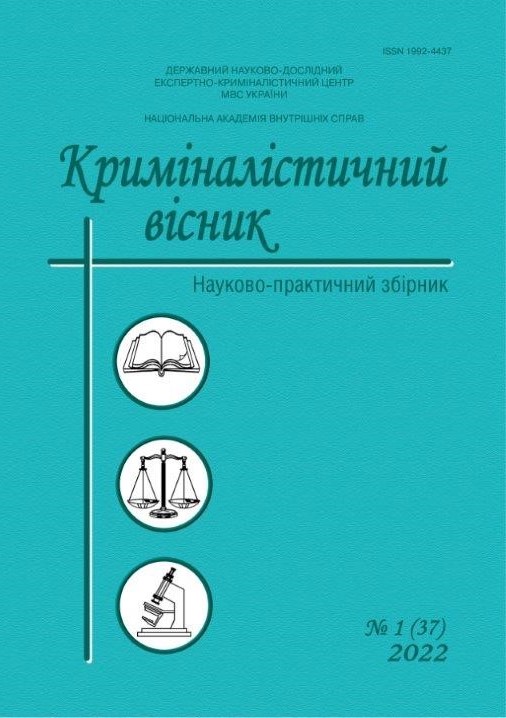EXPERIMENT AS A MEANS OF STUDYING THE COGNITION OF A FORENSIC EXPERT CONCERNING EXPERT INITIATIVE
DOI:
https://doi.org/10.37025/1992-4437/2022-37-1-79Keywords:
expert initiative, the right of expert initiative, forensic expert, experiment, survey, legislative regulation, cognitionAbstract
The purpose of the article is to analyze the cognition of the respondents in relation to the expert initiative using
such a research method as an experiment, as well as to make proposals for the implementation of the right of expert
initiative in the practice of a forensic expert. Methodology. In order to achieve the set goal and solve the problems
caused by it, general scientific and special methods were used. Among them are sociological method, with the help
of which scientific conclusions are confirmed by the results of a survey of employees of expert departments, and
verbal and communicative methods as a group of psychological and psychodiagnostic methods based on written
communication using elements of statistical methodology. Scientific novelty. The research determined the level of
forensic experts’ knowledge of the conceptual apparatus in the field of the law of expert initiative and their mastering
the skills of implementing such law in practice, the balance in the system of theoretical and practical knowledge. It
also substantiated the necessity of systematization of knowledge, harmonization of the regulatory and legal framework
and further algorithmization of the actions of forensic experts within the legal field. Conclusions. With the help of the
experiment as a research method, the cognition of the respondents in relation to the expert initiative was analyzed. As
a result, it was established that the certified forensic experts of the Expert Service of the Ministry of Internal Affairs of
Ukraine, who took part in the survey, nominally acquired the conceptual apparatus in the field of expert initiative, but
do not have a clear understanding of the procedural features of the possible implementation of such a right in practical
work if necessary. The obtained results were systematized, determining the degree of fulfillment of the set tasks and
the effectiveness of the methodology for conducting the experiment as a whole. The level of respondents' knowledge
of the conceptual apparatus in the field of the law of expert initiative was determined, as well as the possibility of its
implementation in practice. Proposals were formulated regarding the implementation of the right of expert initiative
in the practice of forensic experts, suggesting the need for a clear legal regulation of the right of expert initiative as
a specific legal category in terms of improving the quality of the conclusion of a forensic expert and, accordingly,
ensuring the implementation of the basic principles of justice - legality, transparency and impartiality which the legal
states are obliged to adhere to; improvement of the regulatory and legal framework in this area, as well as further
harmonization of domestic legislation; development of a clear mechanism for the implementation of the right of
expert initiative in the practical work of forensic experts, if necessary, which will contribute to improving the quality
of their research and strict adherence to the principles of justice in general, as well as establishing the truth, and protect
the forensic expert from the psychological burden associated with the onset of responsibility for the manifestation of
expert initiative



